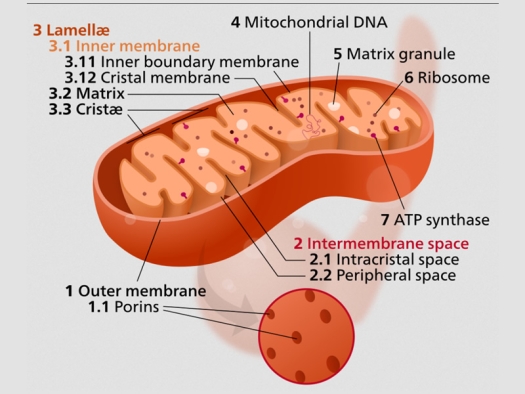Mitochondrion.jpg

Illustration by Kelvinsong / Wikimedia Commons
Signs from the mitochondria
What are the top clues your mitochondria could use some love?
But first: Mitochondria?
We learn they are the “powerhouses” of the cells in biology class, but when it comes to how good we feel every day, mitochondria actually play a huge role. Here are some clues to look for that suggest mitochondrial function is suboptimal:
- Feeling tired, lethargic, or exhausted
- Trouble mustering the energy to exercise
- Muscle aches or poor exercise recovery
- Brain fog or inability to concentrate
- Insulin resistance or poor glucose control
See, the mitochondria are central to our metabolism at a cellular level. We need them working at peak performance for good energy, metabolism, and everything that falls into place after that.
Benefits
If you heard a rattling noise coming from your car engine, would you crank up the radio to drown it out or take it to the repair shop to fix the cause of the noise? I’m guessing you’d want to get it fixed. Am I right? Then why is it when it comes to our bodies and our health so many people choose to cover up their symptoms rather than figure out the cause?
Functional medicine looks under the hood. And when it comes to correcting the source of the problem and optimizing function, one must address the issue on a cellular level.
Or even subcellular – like the mitochondria.
When we support the mitochondria, we optimize the function of the body from the inside out. That means:
- Better Energy
- More Stamina
- Mental Clarity
- Healthier Metabolism
- Graceful Aging
Antioxidants
Why do we need antioxidants? Antioxidants protect our cells from toxins and free radical damage, but they are especially important for protecting our mitochondria.
The thing is that mitochondrial DNA is less protected than nuclear DNA inside cells, so it is even more susceptible to damage from toxins. Here are some effective antioxidants to protect mitochondrial function:
- Resveratrol
- CoQ10 (CoQ10)
- Acetyl-l-Carnitine
- Alpha-Lipoic Acid (ALA)
It also helps to eat lots of fruits & veggies.
Lifestyle
Better mitochondrial function means a better metabolism, more energy, clearer focus, and healthier aging. Here are three things you can do to boost mitochondrial function.
- High-Intensity Interval Training (HIIT means exercising at high intensity for brief bursts)
- Intermittent Fasting (restricting your eating to a timed window each day)
- Cold Exposure (like a cold plunge or cold shower)
Do you already do any of these things? Did you know they are improving your health on a deep and cellular level? If the answer is yes then keep it up. If not, initiate one or more of the suggestions and see if your energy level improves.
Research Update!
Here’s a new research review that links mitochondrial health to insulin resistance, high cholesterol, obesity, and environmental toxins: Reactive oxygen species: role in obesity and mitochondrial energy efficiency.
It goes like this:
Toxic exposures create free radicals in the body → which damage mitochondria → which disrupts metabolic health.
So, what can we do?
We can start by minimizing our exposure to chemicals in everyday products, like plastics, cosmetics, cleaning supplies, and air fresheners.
Then we can boost up our detox abilities by drinking lots of water, eating lots of veggies, and sweating.
Reference
Corkey BE. Reactive oxygen species: role in obesity and mitochondrial energy efficiency. Philos Trans R Soc Lond B Biol Sci. 2023;378(1885):20220210.
Revised by Joanne Quinn, PhD; content provided by Wellnesswriter.com


